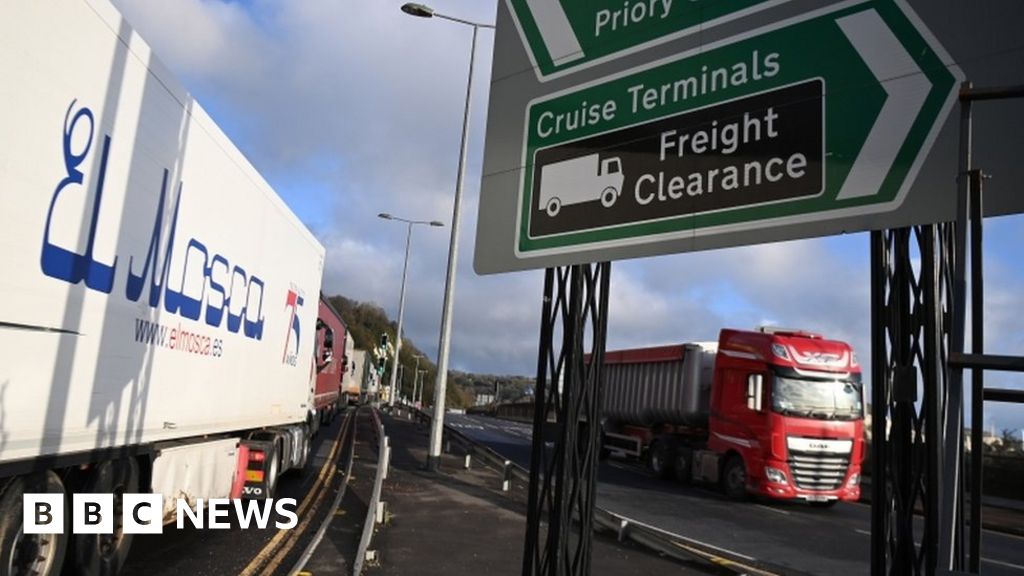Brexit: Firms Warn 'clock Is Ticking' To Keep Goods Moving

By Simon Read
Business reporter
- Published
Businesses have given a relieved welcome to the Brexit trade deal, but warned there was more work to be done.
In a statement, Number 10 said: "The deal is fantastic news for businesses in every part of the UK."
But Jonathan Geldart, director general of the Institute of Directors, said "the clock is still very much ticking" for firms and called for guidance.
The CBI called for urgent confirmation of grace periods to give firms time to adapt to new rules from 1 January.
"We need to ensure we keep goods moving across borders," said Tony Danker, CBI director-general.
He said the deal "will come as a huge relief to British business at a time when resilience is at an all-time low".
"But coming so late in the day, it is vital that both sides take instant steps to keep trade moving and services flowing while firms adjust."
Mr Geldart echoed the CBI's concerns and said digesting the practical changes required and adapting "in the middle of a pandemic and the festive season, while border disruptions continue, is a huge ask" for firms.
After a last-minute titanic struggle over the economic minnow that is fish, a deal has finally been landed.
The relief of avoiding no-deal is the perfect Christmas present for UK business. Having avoided what they considered the calamity of no-deal, minds will now turn to the detail in nearly 2,000 pages of text.
And those who do business with the EU will not have long to peruse it. Even though a deal has been done, UK traders face a new raft of paperwork and cost. More than 200 million additional customs forms will need completing at a cost of more than £7bn a year.
Haulage companies warn that many businesses are not ready for this new normal. That is perhaps understandable when you consider they have had several previous false alarms when they've stockpiled for no reason. They've been dealing with the worst health and economic disaster in living memory and have had precious little detail on exactly what they are facing until the very last minute.
The elephant not in the room and barely mentioned in the deal is services. There is no automatic access to a market worth £100bn to UK firms last year. A huge sigh of relief, yes - but any celebrations may be brief.
Checks and red tape
Helen Dickinson, chief executive of the British Retail Consortium, urged the EU and UK governments to work to implement the new arrangement as soon as possible.
"They must ensure there are no tariffs from Day One and find new ways to reduce the checks and red tape that we'll see from 1 January," she said.
"Businesses are undoubtedly relieved to hear that a deal has been agreed and will be hoping that it will now be ratified by respective parliaments across Europe,' said Richard Burge, chief executive of the London Chamber of Commerce and Industry.
"However, in on-the-ground terms for business, there are likely to still be questions unanswered and operational detail missing."
Business group Logistics UK was optimistic about the deal.
"It removes the risk of tariffs being placed on almost every item imported from the EU, which would have raised prices and slowed the rate of economic growth," said Elizabeth de Jong, the group's policy director.
But TUC general secretary Frances O'Grady was scathing. "This deal is better than nothing, but not by much. It won't protect jobs and puts hard-won workers' rights on the line."
She called on the prime minister to "make good on his promise to level up Britain", saying: "He needs to act fast. There can be no more pointing the finger at the EU."
Financial services
Concerns were raised over the fact that financial services did not form part of the trade deal.
"The agreement should be less criticised for what it contains than what it does not contain - namely the future of financial services," said Daniel Pinto, chief executive of Stanhope Capital Group.
He said the City now needed to take its future in its own hands. "Post-Brexit, it should lure international companies and revamp its regulatory framework to make it much more flexible."
Nicolas Mackel, chief executive of Luxembourg for Finance, said the deal was positive news for financial services.
"While financial services has never been covered by the trade negotiations, this vital breakthrough bodes well for the conversations happening around equivalences and delegation," he said.
"Until now, the souring negotiating mood on the future relationship was putting these important financial footbridges across the Channel under great pressure and there was a risk of collapse."
From Chip War To Cloud War: The Next Frontier In Global Tech Competition
The global chip war, characterized by intense competition among nations and corporations for supremacy in semiconductor ... Read more
The High Stakes Of Tech Regulation: Security Risks And Market Dynamics
The influence of tech giants in the global economy continues to grow, raising crucial questions about how to balance sec... Read more
The Tyranny Of Instagram Interiors: Why It's Time To Break Free From Algorithm-Driven Aesthetics
Instagram has become a dominant force in shaping interior design trends, offering a seemingly endless stream of inspirat... Read more
The Data Crunch In AI: Strategies For Sustainability
Exploring solutions to the imminent exhaustion of internet data for AI training.As the artificial intelligence (AI) indu... Read more
Google Abandons Four-Year Effort To Remove Cookies From Chrome Browser
After four years of dedicated effort, Google has decided to abandon its plan to remove third-party cookies from its Chro... Read more
LinkedIn Embraces AI And Gamification To Drive User Engagement And Revenue
In an effort to tackle slowing revenue growth and enhance user engagement, LinkedIn is turning to artificial intelligenc... Read more

